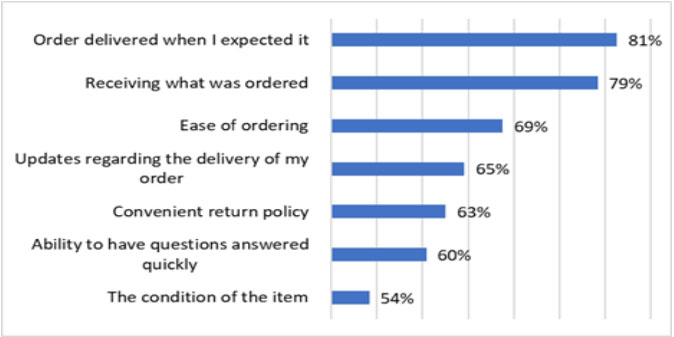The Different Meanings of Customer Service
I don’t think anyone would be surprised that nearly all think customer service is important. Or that just about as many would pay a little more to shop with a company that consistently delivered exceptional customer service. The Nordstrom model comes to mind.
But the catch is that customer service has many meanings. And this may or may not include dealing with a person. While nearly all B2C customers feel that customer service does involve a person, only half of B2B feel the same way.
However, many companies measure customer service in terms of dealing with an agent, thereby missing a lot of important insight.
So, what is important for exceptional customer service? In today’s environment, more and more customers are buying online. And while there are several factors considered important in exceptional customer service when buying online, the first three do not involve a person directly.

On-time delivery tops the list of not only being important overall, but most important for exceptional customer service. (Note, while not directly interacting with a person, on-time delivery does involve a lot of people “behind the scenes”.)
Receiving exactly what was ordered is also important, but not the most important because it is expected. Who orders something and expects to get something else? However, if you have ever experienced getting the wrong item, either the wrong color, size, or a completely different item, you know it is frustrating.
This is not to say that dealing with an agent is not part of customer service because it definitely is. And when a customer service agent is involved, customers want to feel appreciated. Especially in this current environment of “non-contact” and social distancing, customers want the agent to be friendly, kind, and respectful. This may even trump helpfulness but, without doubt, customers still expect resolution.
This need to feel appreciated carries through as the phone is the preferred method of contacting customer service. Even among B2B, the phone is preferred, although slightly less than among B2C.
Nevertheless, customers are somewhat impatient as most will only wait on hold for an agent 10 minutes or less.
That said, many would turn to the company’s website for help if the information was available to answer their question. This presents a viable option if executed accurately.
As everyone has heard before, customers are quick to tell others about a poor experience. This is still true, but word of mouth is polarized. Nearly all will tell others about an exceptional experience as well as a poor experience.
But interestingly, fewer are likely to leave a product review. Some are reluctant to leave a poor review and tarnish the company’s reputation and hope that the company rectifies the issue.
Don’t take the lack of reviews as a mediocre experience. It’s not like baseball and you get 3 strikes. Customers will only forgive a company for 2 mistakes. After that, they shop elsewhere.
All is not lost though. If customers receive a follow up after a less than exceptional experience, they feel better about the company and would be less likely to defect.
So, the question to ask yourself is this. Are you measuring the right factors to accurately understand customer service?

